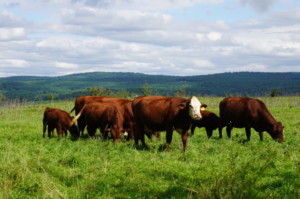Berkshire Agricultural Ventures and Berkshire Blueprint 2.0
A conversation about food and agriculture with Glenn Bergman, Interim Executive Director for Berkshire Agricultural Ventures
By Jonathan Butler, President & CEO
Posted to the Berkshire Edge on November 18,
Editor’s note: This article was authored in collaboration with 1Berkshire’s Marketing team.
Launched in February of 2019, the Berkshire Blueprint 2.0 presented a cluster-based model to address needs and find ways to benchmark achievement in five (soon to be six) industrial clusters. Each aided by an economic partner to help identify challenges and opportunities, the clusters currently include Advanced Manufacturing and Engineering; Creative Economy; Food and Agriculture; Healthcare; and Hospitality and Tourism.
This column is the first in a series devoted to speaking with cluster collaborators. 1Berkshire sat down with Glenn Bergman, Interim Executive Director of Berkshire Agriculture Ventures (BAV), a nonprofit devoted to providing access to flexible financial and targeted technical resources for farmers and local food businesses, with the goal of nourishing a vibrant local food economy. Bergman works closely with 1Berkshire to tackle the challenges the Food and Agriculture cluster faces: costly farmland, technical capacity of farmers, overly-seasonally-focused products, underdeveloped markets, and infrastructure bottlenecks.
The following conversation looks briefly at BAV’s current initiatives, the forward momentum of Berkshire agriculture, and the true cost of producing local food.
Based on your bio, it seems you’ve been drawn to food in some capacity for most of your career, first as a chef, then co-op manager and executive director for a food bank. What drew you to food and agriculture, and how did you find your way to BAV?
BERGMAN: Well, it actually goes back to the 1960s when my mother started a cooking school in our house. As a kid I’d come home from school and get the leftovers, and on Sundays we’d often go shopping in New York’s Chinatown for ingredients.
I found my way to agriculture through my co-op work. When I was the general manager of Weavers Way Co-op in Philadelphia, I could see the impact our work had on the local economy, small farmers, and the quality of product. The phase “think globally but act locally” meant a lot to me.
What brought me to BAV was a friend who asked if I could assist with some fundraising. Once I met Tom Gardner, the board president, a few of the board members, and Neil Chrisman, one of the founders, I was eager to join. BAV is a behind-the-scenes nonprofit helping farmers, food producers, and the region, expand the agricultural economy. It has a beautiful mission and an amazing small staff—it’s an honor to be part of this group.
I’ve always been drawn to the food business because of both my desire to learn more about food—how it brings us together—and for the impact it has on community development. I fell in love with this industry, the people, and the culture.


